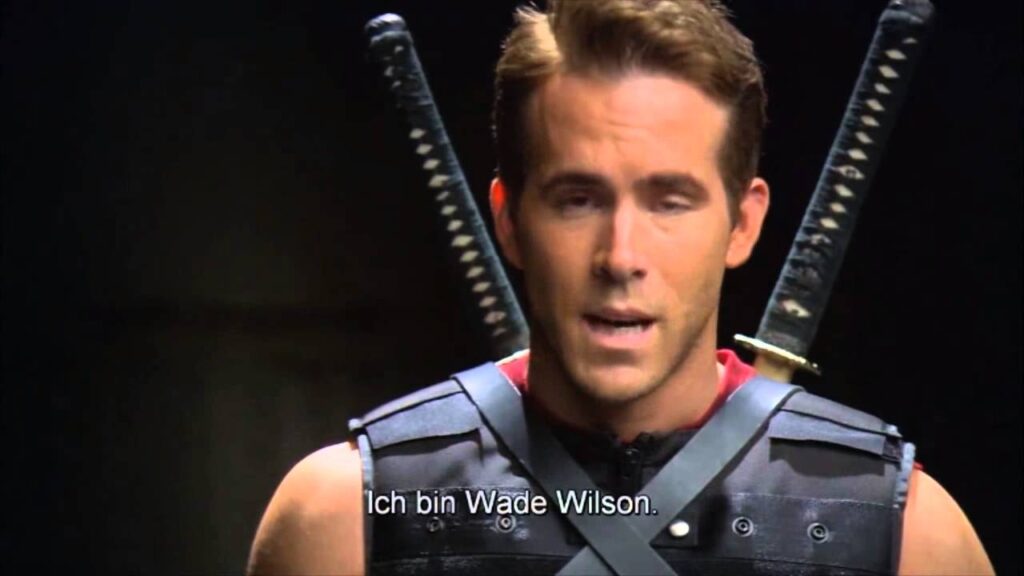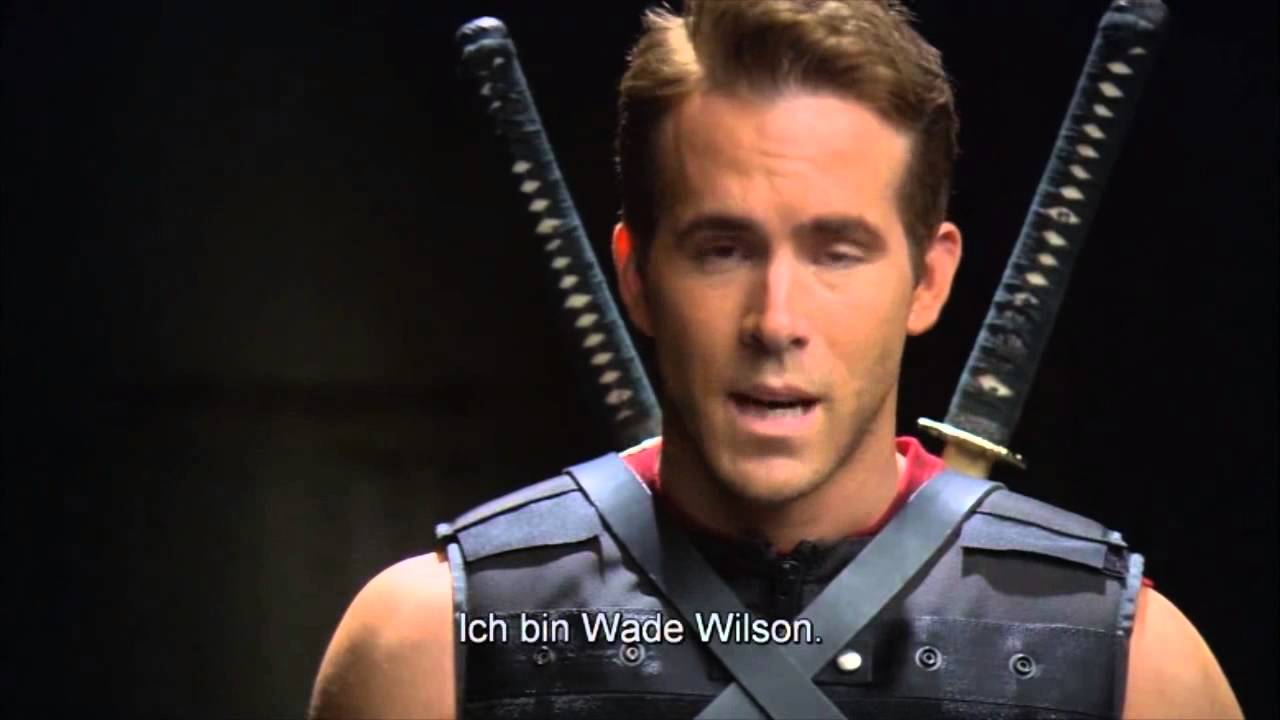
X-Men Origins: Wolverine – Unveiling the Wade Wilson Controversy and Origins
X-Men Origins: Wolverine, released in 2009, aimed to delve into the backstory of one of Marvel’s most popular mutants. However, the film is perhaps equally remembered, if not more so, for its controversial portrayal of Wade Wilson, later known as Deadpool. This article will explore the initial concept of Wade Wilson in X-Men Origins: Wolverine, the changes made to the character, the fan backlash, and the eventual redemption of the character in the standalone Deadpool films. We will also examine the broader impact of this character arc on the X-Men cinematic universe.
The Initial Promise of Wade Wilson
When news broke that Ryan Reynolds, a vocal fan of Deadpool, was cast as Wade Wilson in X-Men Origins: Wolverine, fans were ecstatic. Reynolds seemed perfectly suited to embody the Merc with a Mouth, known for his irreverent humor, fourth-wall breaks, and exceptional fighting skills. The initial glimpses of Wade Wilson in the film hinted at this potential. He was depicted as a skilled mercenary with a sharp wit, engaging in banter with Wolverine and showcasing his combat prowess. This early version of Wade Wilson aligned with the comic book character that fans knew and loved.
The Transformation: From Mercenary to Weapon XI
Unfortunately, the promising start for Wade Wilson took a drastic turn. In the film’s narrative, Wade Wilson is captured by Major William Stryker and subjected to experimentation as part of the Weapon XI program. This program aimed to create the ultimate mutant killer by combining the powers of multiple mutants into one being. The result was a character that bore little resemblance to the Deadpool fans were expecting. He was essentially stripped of his personality, his mouth was sewn shut, and he was given an array of powers that seemed arbitrarily chosen. This version of Wade Wilson, often referred to as Weapon XI or Deadpool, became a mindless killing machine, controlled by Stryker.
Fan Backlash and Disappointment
The portrayal of Wade Wilson in X-Men Origins: Wolverine was met with widespread criticism and disappointment from fans. The character’s deviation from the source material was seen as a betrayal of the essence of Deadpool. The decision to silence him, removing his most defining characteristic, was particularly egregious. Fans felt that the potential of Ryan Reynolds’ casting was wasted, as the character was reduced to a generic villain with no personality. The changes made to Wade Wilson in X-Men Origins: Wolverine sparked outrage and became a major point of contention for the film.
Ryan Reynolds’ Disappointment and Advocacy
Ryan Reynolds himself was reportedly unhappy with the direction of Wade Wilson’s character in X-Men Origins: Wolverine. Despite his initial enthusiasm for the role, he felt that the final product did not do justice to the character. Reynolds became a vocal advocate for a more faithful adaptation of Deadpool, and he spent years working to bring a proper Deadpool movie to the screen. His dedication and passion for the character played a crucial role in the eventual creation of the Deadpool films that fans know and love.
The Redemption: Deadpool (2016) and Deadpool 2 (2018)
After years of development and campaigning, Ryan Reynolds finally got his chance to redeem the character of Deadpool with the release of Deadpool in 2016. This film was a stark contrast to the portrayal in X-Men Origins: Wolverine. It embraced the character’s humor, fourth-wall breaks, and violent tendencies. Deadpool was a critical and commercial success, proving that a faithful adaptation of the character could resonate with audiences. The film’s success paved the way for Deadpool 2 in 2018, which further cemented Deadpool’s place in the hearts of fans. These films effectively erased the memory of the X-Men Origins: Wolverine version of Wade Wilson, replacing it with a portrayal that was true to the source material.
Deadpool’s Unique Abilities and Origins
In the comics, Wade Wilson is a mercenary who undergoes the Weapon X program in an attempt to cure his cancer. This grants him an accelerated healing factor, making him nearly immortal. This healing factor also affects his brain cells, contributing to his unstable mental state and his tendency to break the fourth wall. Unlike the Weapon XI version, the comic book Deadpool retains his personality and sense of humor, even after his transformation. These elements were faithfully adapted in the standalone Deadpool films, providing a stark contrast to the portrayal in X-Men Origins: Wolverine.
The Impact on the X-Men Cinematic Universe
The controversial portrayal of Wade Wilson in X-Men Origins: Wolverine had a significant impact on the X-Men cinematic universe. It highlighted the importance of staying true to the source material when adapting comic book characters. The success of the Deadpool films demonstrated that audiences were willing to embrace unconventional characters and narratives, as long as they were well-executed. The Deadpool films also opened the door for more R-rated superhero movies, pushing the boundaries of what was acceptable in the genre. The legacy of X-Men Origins: Wolverine serves as a cautionary tale, while the success of the Deadpool films represents a triumph for fan advocacy and faithful adaptation. The evolution of Wade Wilson from a disappointing villain to a beloved anti-hero is a testament to the power of creative vision and dedication. The portrayal of Wade Wilson in X-Men Origins: Wolverine is often cited as one of the worst character adaptations in comic book movie history. The character, later known as Deadpool, was drastically altered from his comic book counterpart, leading to widespread fan disappointment. This article delves into the specifics of that adaptation, its impact, and the subsequent efforts to redeem the character. The initial introduction of Wade Wilson in the film showed promise. Ryan Reynolds, a known fan of the character, was cast in the role, and early scenes hinted at the wisecracking mercenary fans loved. However, this promise was quickly shattered when Wade Wilson was transformed into Weapon XI, a mute and heavily modified super-soldier. This version of Wade Wilson bore little resemblance to the Deadpool of the comics, a fact that angered many fans. The backlash against the Wade Wilson portrayal in X-Men Origins: Wolverine was significant. Fans criticized the decision to remove his mouth, his signature wit, and his overall personality. The character was essentially unrecognizable, and the wasted potential of Ryan Reynolds in the role was a major point of frustration. The failure of Wade Wilson in X-Men Origins: Wolverine served as a lesson for future adaptations. It highlighted the importance of staying true to the source material and understanding what makes a character beloved by fans. Despite the initial disappointment, the story of Wade Wilson eventually had a positive outcome. Ryan Reynolds’ dedication to the character led to the creation of the standalone Deadpool films, which were far more faithful to the comics. These films were a critical and commercial success, proving that a proper adaptation of Deadpool could be a hit with audiences. The Deadpool films effectively redeemed the character of Wade Wilson, erasing the memory of the X-Men Origins: Wolverine version from many fans’ minds. The success of Deadpool also paved the way for more R-rated superhero films, demonstrating that audiences were willing to embrace more mature and unconventional content. The contrast between the Wade Wilson of X-Men Origins: Wolverine and the Deadpool of the standalone films is stark. One is a poorly conceived and executed villain, while the other is a beloved and iconic anti-hero. This transformation is a testament to the power of fan advocacy and the importance of respecting the source material. The journey of Wade Wilson from X-Men Origins: Wolverine to the Deadpool films is a fascinating case study in comic book movie adaptations. It demonstrates the potential pitfalls of straying too far from the source material, as well as the rewards of staying true to the spirit of a character. The story of Wade Wilson is ultimately one of redemption, both for the character and for the X-Men cinematic universe. The X-Men Origins: Wolverine debacle with Wade Wilson taught valuable lessons. [See also: The Evolution of Deadpool in Film] The subsequent success of Deadpool showcased what could be achieved with proper care and respect for the source material. Wade Wilson‘s journey is a reminder that even the most disappointing beginnings can lead to triumphant outcomes. The legacy of X-Men Origins: Wolverine and its treatment of Wade Wilson continues to influence comic book movie adaptations today. The film serves as a cautionary tale, while the Deadpool films serve as an inspiring example. Ultimately, the story of Wade Wilson is a testament to the enduring power of comic book characters and the importance of faithful adaptation. The redemption of Wade Wilson is a victory for fans everywhere. The character’s journey from X-Men Origins: Wolverine to the standalone Deadpool films is a remarkable story of creative resilience and fan advocacy. The success of the Deadpool films proves that audiences are willing to embrace unconventional and irreverent characters, as long as they are well-executed and true to their source material. The legacy of Wade Wilson in the X-Men cinematic universe is one of both failure and triumph. The character’s initial portrayal in X-Men Origins: Wolverine was a major misstep, but his subsequent redemption in the Deadpool films is a testament to the power of creative vision and fan dedication. The story of Wade Wilson is a reminder that even the most disappointing beginnings can lead to extraordinary outcomes.
The Future of Deadpool
With the acquisition of 20th Century Fox by Disney, the future of Deadpool in the Marvel Cinematic Universe (MCU) is uncertain. However, Kevin Feige, the head of Marvel Studios, has confirmed that Deadpool will remain R-rated and will eventually be integrated into the MCU. This is welcome news for fans who were concerned that the character would be watered down under Disney’s ownership. The integration of Deadpool into the MCU presents exciting possibilities for future storylines and interactions with other Marvel characters. The character’s unique brand of humor and fourth-wall breaking could bring a fresh and unpredictable element to the MCU.
Conclusion
The story of Wade Wilson in X-Men Origins: Wolverine is a complex one, filled with disappointment, controversy, and eventual redemption. The initial portrayal of the character was a major misstep, but the success of the Deadpool films has more than made up for it. The character’s journey serves as a reminder of the importance of staying true to the source material and respecting the vision of creators and fans. The future of Deadpool in the MCU is bright, and fans can look forward to seeing more of the Merc with a Mouth in the years to come. The evolution of Wade Wilson is a testament to the power of fan advocacy and creative vision. The journey from a disappointing villain to a beloved anti-hero is a remarkable story of redemption and triumph. The legacy of Wade Wilson will continue to influence comic book movie adaptations for years to come, serving as both a cautionary tale and an inspiring example. The initial promise of Wade Wilson was betrayed in X-Men Origins: Wolverine. The transformation into Weapon XI was a disservice to the character and a disappointment to fans. However, the subsequent redemption of Wade Wilson in the Deadpool films has more than made up for this initial misstep. The character’s journey is a testament to the power of creative vision and fan dedication. The legacy of Wade Wilson will continue to inspire and entertain audiences for years to come. The initial portrayal of Wade Wilson was a major misstep, but the success of the Deadpool films has more than made up for it. The character’s journey serves as a reminder of the importance of staying true to the source material and respecting the vision of creators and fans. The future of Deadpool in the MCU is bright, and fans can look forward to seeing more of the Merc with a Mouth in the years to come.

